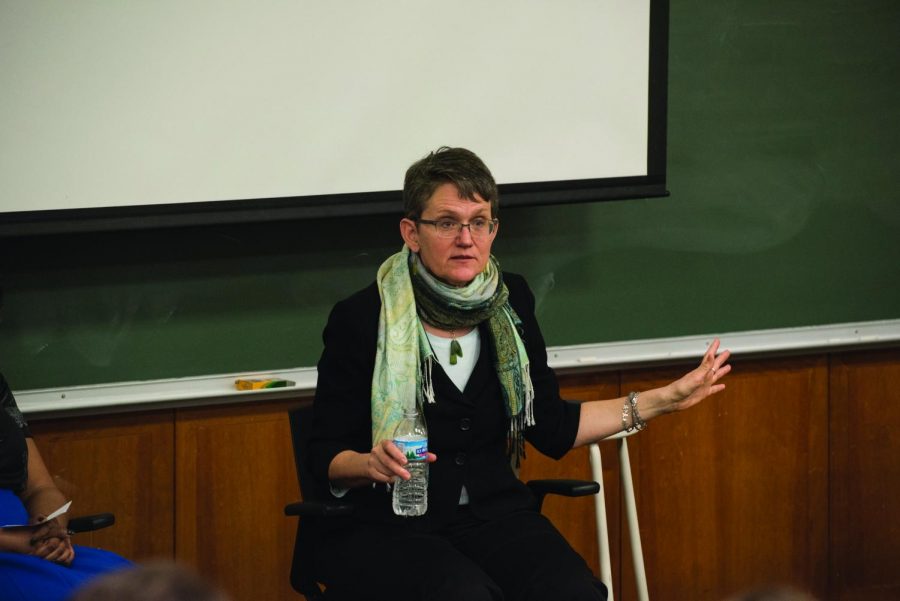Journalist E.J. Graff addresses activism, reporting in wake of #MeToo movement
Katie Pach/Daily Senior Staffer
Journalist E.J. Graff speaks at an event Monday. In the presentation and Q&A, Graff addressed the historical precedents and future possibilities for the #MeToo movement.
February 20, 2018
The #MeToo movement is a “wildfire moment” for the nation as emerging women have exposed the pervasiveness of sexual harassment, journalist E.J. Graff said at a Monday event.
“They have been wandering in the wilderness, often traumatized,” she said. “Resentful of how these powerful creeps derailed their careers and their lives. Furious, as we now know.”
Graff, currently the managing editor of the Monkey Cage at The Washington Post, spoke about the “#MeToo moment” to an audience of about 50 at Annenberg Hall. The event, sponsored by the Women’s Center, consisted of a presentation by Graff and a Q&A panel that also included Women’s Center staff.
Other historical instances have similarly sparked national conversation and outrage, Graff said. For example, after U.S. attorney Anita Hill alleged she was harassed by her former boss, current Supreme Court Justice Clarence Thomas, more women than ever ran for office, Graff said.
However, she added, social change requires time to “metabolize,” and no single moment can “change everything.” While the Anita Hill hearing brought much more awareness to the idea of sexual harassment, it did not stop harassment from occurring, she said.
To create lasting change, Graff told The Daily, people have to follow through after the initial burst of energy ends and hold their institutions accountable.
“There are wildfire moments and there are institution-building moments,” Graff said. “You need both. The wildfire can’t last; it’s just not human nature to stay in full outrage for too long.”
In her presentation, Graff listed some ways she would combat sexual harassment if she were “queen of the world,” like by replacing every man ousted for sexual harassment with a woman and giving raises or promotions to five women for every year a predator worked at an organization.
John Wilson, an Evanston resident who attended the event, said while such solutions seemed unrealistic, it was refreshing to hear something aside from the “cynicism” many express.
“In many ways it’s encouraging that she has a very optimistic view of this current movement, because it’s easy to look at the past and see where things haven’t changed,” Wilson said. “It’s good to hear those kinds of idealistic appeals.”
During the Q&A session, the panel addressed how to report on issues of sexual harassment and assault to an audience that included many journalism students and faculty.
Graff stressed the importance of respecting a source’s decision to share or withhold their story. “No means no” when people do not agree to have their experiences or their names published, she said.
Women’s Center director of programs Alecia Wartowski, who formerly worked as a legal aid, said she would hear hundreds of stories every year of children being abused. She warned the audience to be aware of “vicarious trauma” when listening to others’ experiences.
“When you hear people’s stories, when you take them in, you actually experience trauma,” Wartowski said. “We need to understand that when we are in those professions where we’re having human contact and connection and we hear those stories, that we also have to be given the support to hold those stories.”
In response to an audience question about men’s role in the #MeToo movement, Women’s Center director Sekile Nzinga-Johnson said everyone, regardless of gender, has a role to play in fighting harassment. Men throughout history have supported women’s rights movements, she said, although many still contribute to the problem by remaining “bystanders.”
Graff pointed out that the group of harassers is proportionately small, and “men are human beings too.” Many need to pitch in for change to occur, she said.
“It can’t be done without all humans,” Graff said.
Email: [email protected]
Twitter: @madsburk


